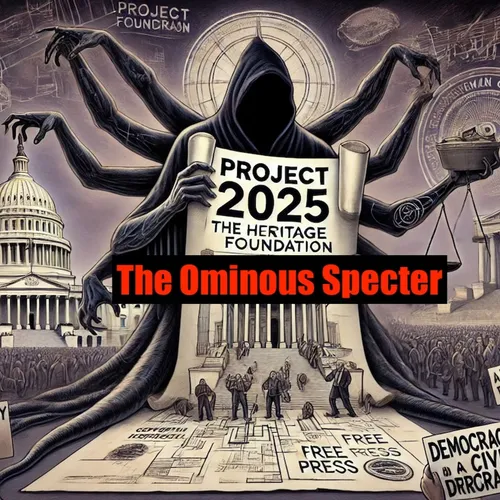Conservative Project 2025: Reshaping America's Future
- Author
- Quiet.Please
- Published
- Sun 19 Jan 2025
- Episode Link
- https://www.spreaker.com/episode/conservative-project-2025-reshaping-america-s-future--63754952
As I delved into the intricacies of Project 2025, a comprehensive blueprint crafted by the Heritage Foundation, I was struck by the sheer scope and ambition of this conservative initiative. Unveiled in April 2023, Project 2025 is more than just a policy guide; it is a vision for a radical overhaul of American governance, federal agencies, and the very fabric of societal policies.
At its core, Project 2025 is designed to serve as a roadmap for the next Republican president, outlining sweeping changes across various sectors. The project is built around four key pillars: a detailed policy guide, a database of potential personnel, a training program for future administration members, and a playbook for actions to be taken within the first 180 days in office[3].
One of the most striking aspects of Project 2025 is its proposal to dramatically reshape the federal government's structure and function. The plan advocates for the dismantling of several major agencies, including the Department of Homeland Security and the Department of Education. The Department of Education, in particular, would be abolished, with its programs either transferred to other departments, such as the Department of Health and Human Services, or terminated outright. This move is part of a broader strategy to reduce the federal government's role in education, promoting instead a system where education is largely managed by the states[1].
The impact on education would be profound. Federal funding for low-income students under Title I of the Elementary and Secondary Education Act of 1965 would be allowed to expire, and public funds would be redirected as school vouchers, even for parents sending their children to private or religious schools. The Head Start program, a cornerstone for services to children of low-income families, would be eliminated. This shift reflects the project's underlying philosophy that education is a private rather than a public good[1].
Project 2025 also envisions significant changes in the realm of healthcare and social services. It proposes cutting Medicare and Medicaid, and urges the government to explicitly reject abortion as healthcare. The plan goes further by advocating for the elimination of coverage for emergency contraception and the use of the Comstock Act to prosecute those who send and receive contraceptives and abortion pills. This stance is part of a broader effort to align healthcare policies with conservative principles, as evident in the project's call to reduce funding for research involving embryonic stem cells and to make the National Institutes of Health (NIH) less independent[1].
The project's approach to environmental and climate policies is equally contentious. It recommends reducing environmental and climate change regulations to favor fossil fuels, and proposes that the Environmental Protection Agency (EPA) should not use "unrealistic" projections of climate change impacts. The EPA would also be required to obtain clear congressional authorization for any science activity, and Congress would be urged to reform or repeal the 1990 law that created the U.S. Global Change Research Program (USGCRP), which the project argues has been "misused for political purposes"[4].
In the realm of science policy, Project 2025 prioritizes fundamental research over deployment, arguing that many current programs act as subsidies to the private sector. The Department of Energy would focus on research that the private sector would not otherwise conduct, while programs focused on energy technology development and climate change would be eliminated. Additionally, the project proposes restricting academic and technology exchanges with countries labeled as adversaries, particularly China, in the name of tightening research security[4].
The expansion of presidential powers is another central theme of Project 2025. The project advocates for a unitary executive...
